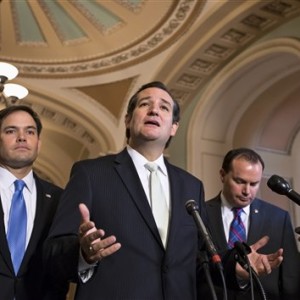In five days, Republican voters in 13 states will decide if Ted Cruz can out-Trump Donald Trump on immigration.
The Texas senator attempted to position himself to the right of Trump this week on the issue of what to do with the estimated 12 million immigrants living in the United States illegally, telling Fox News’ Bill O’Reilly Monday night that he would use Immigration and Customs Enforcement (ICE) to round up the entire population. “That’s what ICE exists for. We have law enforcement who looks for people who are violating the law and deports them,” the Republican presidential contender said.
Cruz said under his administration there would be no exceptions for illegal immigrants who have been in the United States for years, living, working and even raising families — a position more unforgiving of the country’s undocumented population than many immigration hard-liners in the rest of his party.
One exception might be Trump, the GOP front-runner who climbed to the top of a once-crowded Republican presidential field in part on the strength of his vow to secure the Mexican border.
Like Cruz, the New York billionaire says there will be no exceptions for immigrants who have put down roots in the U.S. — “They’re here illegally, they have to go,” Trump said in South Carolina earlier this month. “What’s going to happen is, you’re going to start moving them out, others are then gonna leave. You know, it’s not like you’re gonna move 11 million — others are gonna leave.”
But earlier in the campaign, Trump made it clear that under his plan, many or even most illegal immigrants would be allowed to return in expedited fashion — a “touchback” policy, as it’s come to be called in Washington’s deadlocked decade-long debate over fixing the nation’s broken immigration system.
The sharpened rhetoric on immigration didn’t save Cruz from getting thumped by Trump by more than 20 points Tuesday in Nevada’s Republican caucuses, where the New York billionaire came away with 45 percent of the Hispanic vote, despite facing two top rivals who are each Spanish-speaking, first-generation sons of Cuban immigrants.
All the Republican candidates are playing with fire, considering that an estimated 28 million Hispanics are expected to go to the polls this fall, according to Hector Sanchez, chairman of the National Hispanic Leadership Agenda.
“The rise and growing prevalence of such anti-immigrant rhetoric is completely unacceptable,” he said of Cruz’s latest comments. “Any serious candidate for the presidency must be willing to seriously address the issues that impact Latinos in America.
“It is time for real solutions and action not unrealistic rhetoric,” he told InsideSources.
Rep. Luis V. Gutiérrez, D-Ill., warned in a Boston Globe op-ed Thursday that the Republican march to the right on immigration would render the GOP a minority party for years.
“The changing demographics of this country – and the Republican Party’s insistence on practicing the politics of exclusion — mean that the Democrats will occupy the White House for the foreseeable future, perhaps for the next generation,” wrote Gutiérrez, long one of Congress’ most outspoken supporters of immigrant rights.
But the Cruz campaign is counting on a tougher tone on immigration paying dividends in the southern Super Tuesday states of Alabama, Arkansas, Georgia and especially Texas, the senator’s home turf, where some of the country’s most outspoken opponents of illegal immigration were elected to statewide office in 2014, including Gov. Greg Abbott and Lt. Gov. Dan Patrick, both of whom have endorsed Cruz.
Cruz, who has argued that Rubio can’t beat Trump, got fresh ammunition Thursday when the latest Quinnipiac Poll showed the Florida senator getting trounced by the GOP front-runner in the Sunshine State, 44 percent to 28 percent. Cruz, meanwhile, seems to be maintaining a lead in his home state of Texas — at least according to a couple of polls, including a survey released Thursday from Monmouth that has him 15 points up on Trump.

